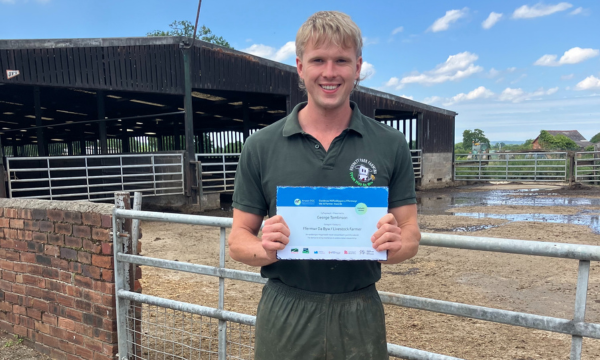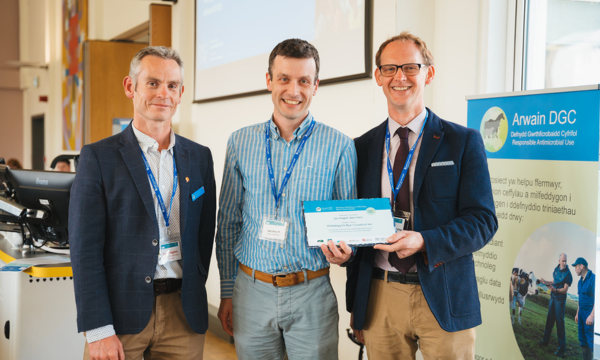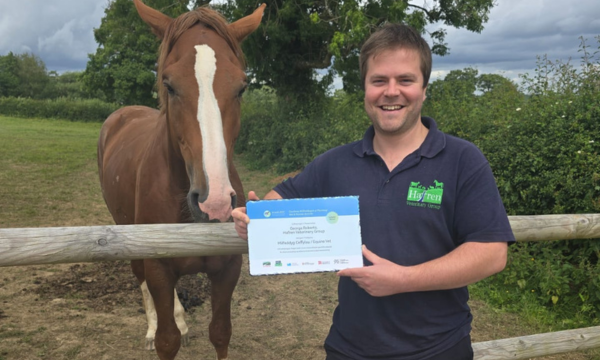Welsh farmers and vets have been recognised for their pivotal role in preventing the spread of antimicrobial resistance (AMR) in animals and the environment.
Their efforts to combat AMR and safeguard antibiotic efficacy for future generations are part of the innovative Arwain DGC (Defnydd Gwrthficrobaidd Cyfrifol / Responsible Antimicrobial Use) programme.
An award-winning programme, Arwain DGC helps vets, farmers, and horse owners in Wales to reduce the risk of AMR by promoting animal health and productivity, training, the application of new technology, data gathering, and research.
AMR is a ‘One Health’ concern, and the work being done by farmers in Wales has been acknowledged as making an important impact on safeguarding antibiotic efficacy for future generations.
The drive to reduce the need to use antibiotics by embracing new technology and farm practices was highlighted at the Arwain Vet & Farmer Conference in Aberystwyth, where certificates were presented to farmers and vets for demonstrating ‘Excellence in Antimicrobial Stewardship’ by Dr Richard Irvine, Chief Veterinary Officer for Wales.
The awards celebrate the achievements of livestock vets, equine vets, and livestock farmers in raising awareness of reducing the need to use antibiotics and taking steps to achieve a reduction.
Arwain DGC programme manager Dewi Hughes said:
“The standard of nominations was extremely high, which reflects so well on the commitment of farmers and vets to reduce the risk of antimicrobial resistance.
“So many farmers and vets in Wales are working together to reduce the need to use antibiotics and promote antimicrobial stewardship. Their activities and comitment are making an impact, and it’s fantastic to recognise and celebrate these true champions of responsible antibiotic use.”
The Winners
Farmer Award – Joint winners
Owen Davies
Commended for his proactive approach, Haverfordwest dairy farmer Owen Davies of Great Newton Farm is an early adopter of the SmaXtec bolus system on his 400-cow milking herd. The system helps monitor individual animal health in real-time 24/7 and identify problems early or at a pre-symptomatic stage.
All cows that register high temperatures or other health alerts from the indwelling boluses now receive meloxicam and are CMT (California Milk Test) tested for suspected mastitis cases.
Since investing in the technology and implementing actionable protocols based on the data collected, combined with making a conscious effort to reduce antibiotic usage, Owen has significantly reduced the use of intramammary antibiotic tubes and injectable amoxicillin and increased animal health and well-being.
George Tomlinson

Wrexham organic dairy farmer George Tomlinson has introduced management changes to improve calf health and growth rate in his appoximately 600 cow herd at Lower Park Farm.
Over the past one to two years, George has made a series of management changes that have improved the health and growth rate of the young calves. This has dramatically reduced the levels of pneumonia and respiratory disease in the calves, significantly reducing the need for antibiotic treatments.
Innovations include a robust colostrum management protocol, testing and improved housing ventilation.
Consequently, antibiotic use for pneumonia has reduced by 50% in the last 12 months, and none have been needed in the last six months.
George is also involved in a Farming Connect Discussion Group Project, which involves an ultrasound scan of the calves’ lungs to monitor subclinical respiratory disease and lung lesions.

Livestock Vet Award – Joe Angell, Wern Vets Cyf
North Wales vet Joe Angell received the livestock vet award for his proactive approach to improving health and performance, commitment to reducing antibiotic use, and involvement in research studies, industry campaigns and projects, including Arwain DGC and Stoc + with Hybu Cig Cymru.
He has helped his clients adopt good practices, including tackling lameness in sheep and reducing the use of antibiotics at lambing through monitoring BCS and colostrum quality. He helped one farmer reduce the incidence of lameness from 10% to 2%, which has significantly reduced antibiotic use on the farm.
Equine Vet Award – George Roberts, Hafren Veterinary Group

Powys vet George Roberts was recognised for his outstanding equine work and significant contribution to the Veterinary Prescribing Champions network.
George’s nomination highlighted how he ensured that an endurance horse was kept in top condition by implementing a health plan that included reducing the biosecurity risk. Also, he devised a treatment injury programme that used the minimum antibiotics to ensure full recovery.
